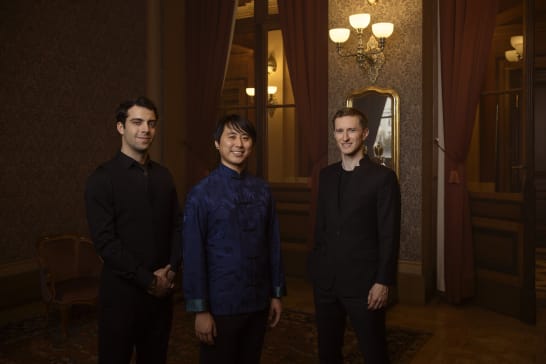Curtis Institute of Music Celebrates 100th Anniversary with Curtis Studio Album A Century of New Sounds

Press Contacts:
Patricia K. Johnson | patricia.johnson@curtis.edu | (215) 717-3190
Ryan Scott Lathan | ryan.lathan@curtis.edu | (215) 717-3145
PHILADELPHIA, PA—October 4, 2024—Curtis Studio—the recording label of the Curtis Institute of Music, dedicated to the discovery of new and traditional works performed by some of the most inspiring artists of our time—is proud to announce the release of its fifth recording: A Century of New Sounds, a collection of nine works chosen in honor of Curtis’ historic 100th anniversary season, and celebrating the artistry and innovation of the school’s alumni, faculty, and students. Featuring performances by GRAMMY Award-winning quintet Imani Winds and the Dover Quartet, called “one of the greatest quartets of the last 100 years” by BBC Music Magazine, the album was recorded on the school’s historic campus in Philadelphia. This remarkable collection of chamber music presents a wide range of musical styles and eclectic ideas from Curtis composers past and present, including Samuel Barber (’34), Leonard Bernstein (Conducting ’41), Julius Eastman (’63), Jennifer Higdon (’88), Curtis composition faculty member Jonathan Bailey Holland (’96), David Serkin Ludwig (’01), Ned Rorem (’44), Gabriella Smith (’13), and George Walker (’45). Distributed by Platoon, A Century of New Sounds is now available for pre-add on Apple Music Classical, pre-save on Spotify, and will be available on all other major streaming platforms beginning October 11, 2024. More info at curtis.edu/century.
“New music has been central to Curtis’s story since the school first opened its doors,” says Nick DiBerardino (Composition ’18), Curtis New Music Ensemble director, acclaimed composer, chair of composition studies, and provost and dean of Curtis. “This small but impactful group of composers, heard together, offers listeners a sonic taste of the many distinct musical voices that have emerged from Curtis. The combined efforts of these composers represent a deep commitment to the future of our art form and a blend of tradition and innovation that is a hallmark of the Curtis approach. Whether articulated on strings, winds, brass, percussion, or keyboards, as performed by Curtis faculty, alumni, or current students, this music is a testament to the quality, expressivity, and individuality of Curtis composers.”
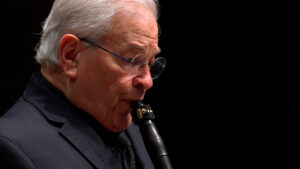
A Century of Sounds opens with Leonard Bernstein’s first published work, the Sonata for Clarinet and Piano, featuring acclaimed alumnus, Avery Fisher Career Grant and Avery Fisher Prize-winner, clarinetist David Shifrin (’73) and renowned pianist Amy Yang (’06), director of chamber music and piano studies at Curtis. Composed in 1941, at the same time he was graduating from Curtis and attending the Tanglewood Music Festival in Massachusetts, the sonata was influenced by his contemporaries and dedicated to his close friend, clarinetist David Oppenheim. This exuberant, rhythmically intricate piece reflects the youthful enthusiasm of the composer, a collision of jazz and blues inflections with a neo-classical, contrapuntal style of writing influenced by his studies with Paul Hindemith during his summers at Tanglewood.
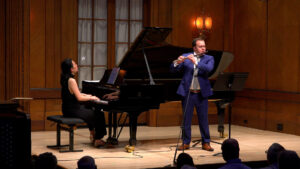
Samuel Barber’s introspective Canzone (Elegy) for Flute and Piano, Op. 38a perfectly illustrates the neo-romantic composer’s gift for creating chamber works of unparalleled emotional depth. Initially composed in 1959 and dedicated to German art student and amateur flutist Manfred Ibe under the title Elegy for Flute, the piece was then integrated as the basis for the second movement of his Pulitzer Prize-winning Piano Concerto, Op. 38. The title “Canzone,” which translates to “song” in Italian, reflects the song-like nature of the movement and has become a concert favorite among flutists for this lovely, conversational interplay with the piano. Pianist Amy Yang and flutist Patrick Williams’ (’14) masterful interpretation of this nostalgic piece brings out the lush lyricism of Barber’s writing, drawing out the long, sweeping lines, delicate harmonic shifts, and unresolved emotion of the composition.
“In this music, we reflect on a life devoted to the musical arts,” notes Ms. Yang, commenting on the Canzone (Elegy), and Barber, one of the most important voices in 20th century American music. “This song finds its place to sing, in celebration, back home on this centenary album, with a matured assurance of someone whose musical gifts continue to break ground and inspire.”
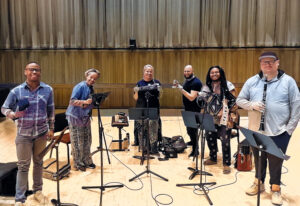 Pulitzer Prize and GRAMMY Award-winning composer Jennifer Higdon’s (’88) Autumn Music follows, featuring an astounding performance by 2024 GRAMMY winners Imani Winds, Curtis’ first-ever faculty wind quintet. Written as an homage to Samuel Barber and that composer’s only chamber composition for the woodwind quintet literature—the bluesy, virtuosic Summer Music—Higdon’s vibrant, evocative piece is “a musical portrait of the essence and images of Autumn.” In writing about the piece, she notes that “Autumn comes to us in many guises: incredible explosions of color; air that suddenly snaps with crispness and clarity; a tinge of melancholy on the eve of change in all of our lives.” Flutist Brandon Patrick George, oboist Toyin Spellman-Diaz, bassoonist Monica Ellis, horn player Kevin Newton, and clarinetist Mark Dover capture the transient beauty of the season, a time of reflection and renewal.
Pulitzer Prize and GRAMMY Award-winning composer Jennifer Higdon’s (’88) Autumn Music follows, featuring an astounding performance by 2024 GRAMMY winners Imani Winds, Curtis’ first-ever faculty wind quintet. Written as an homage to Samuel Barber and that composer’s only chamber composition for the woodwind quintet literature—the bluesy, virtuosic Summer Music—Higdon’s vibrant, evocative piece is “a musical portrait of the essence and images of Autumn.” In writing about the piece, she notes that “Autumn comes to us in many guises: incredible explosions of color; air that suddenly snaps with crispness and clarity; a tinge of melancholy on the eve of change in all of our lives.” Flutist Brandon Patrick George, oboist Toyin Spellman-Diaz, bassoonist Monica Ellis, horn player Kevin Newton, and clarinetist Mark Dover capture the transient beauty of the season, a time of reflection and renewal.
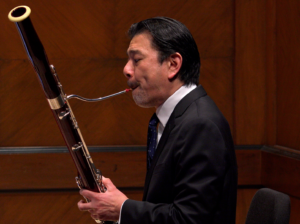 Three Pictures from the Floating World, by prize-winning alumnus and former faculty member David Serkin Ludwig (’01), draws its title and watery inspiration from pieces by French impressionist composer Claude Debussy and the “Ukiyo-e” (“the floating world”) Japanese print-making tradition, famously noted through works like The Great Wave from Hokusai’s woodcut series Thirty-Six Views of Mount Fuji. Adapted from Mr. Ludwig’s Pictures from the Floating World, a bassoon concerto commissioned and premiered by Curtis faculty member, and the Philadelphia Orchestra principal bassoonist Daniel Matsukawa (’92), Three Pictures “describes our lives as beings in nature, while time floats fleetingly by us.” Across three movements, the bassoon quartet of Daniel Matsukawa and Curtis students—violinist Emmalena Huning, violist Sumin Kim, and cellist Ania Lewis—evoke the sounds of sails fluttering in the salty ocean air; the beguiling voices of the mythological Sirens who lured sailors to their doom; and the tragic tale of Ondine, the immortal water spirit forced to return to her watery realm, as they paint a vivid tableau of the sea’s ageless and mysterious charms.
Three Pictures from the Floating World, by prize-winning alumnus and former faculty member David Serkin Ludwig (’01), draws its title and watery inspiration from pieces by French impressionist composer Claude Debussy and the “Ukiyo-e” (“the floating world”) Japanese print-making tradition, famously noted through works like The Great Wave from Hokusai’s woodcut series Thirty-Six Views of Mount Fuji. Adapted from Mr. Ludwig’s Pictures from the Floating World, a bassoon concerto commissioned and premiered by Curtis faculty member, and the Philadelphia Orchestra principal bassoonist Daniel Matsukawa (’92), Three Pictures “describes our lives as beings in nature, while time floats fleetingly by us.” Across three movements, the bassoon quartet of Daniel Matsukawa and Curtis students—violinist Emmalena Huning, violist Sumin Kim, and cellist Ania Lewis—evoke the sounds of sails fluttering in the salty ocean air; the beguiling voices of the mythological Sirens who lured sailors to their doom; and the tragic tale of Ondine, the immortal water spirit forced to return to her watery realm, as they paint a vivid tableau of the sea’s ageless and mysterious charms.
“A few years after the premiere, I asked David if he could please create a version for bassoon and string trio,” says Mr. Matsukawa. “This version was originally composed for the Philadelphia Chamber Music Society and compositionally speaking, is a phenomenal adaptation of the original work. When David first started composing this work, he told me he was thinking a lot about bassoon fluidity and the interaction of Japanese art with French composers, more specifically, Debussy. Being very interested in instances where cultures overlap and connect, he was yearning to find the connection between myself and Yannick within the language we both shared.”
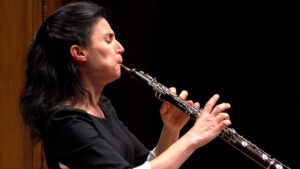 Celebrated alumnus, longtime faculty member, and Pulitzer Prize-winning composer Ned Rorem (’44) was once praised by Time magazine as “the world’s best composer of art songs,” but the late, great musician was also quite skilled at writing instrumental works. Mountain Song, originally composed for flute and piano as background music for a play by British poet, writer, and actress Iris Tree, paraphrases the tune of a lilting southern folksong. Katherine Needleman (’99), Curtis faculty member and prize-winning principal oboist of the Baltimore Symphony Orchestra, joins captivating pianist Natalie Zhu (’97), recipient of the Avery Fisher Career Grant, in a richly nuanced performance of this deceptively simple work, drawing out the composition’s delicate interplay of light and shadow, while illuminating the sun-dappled, soaring lyricism, playful dissonance, and elegant restraint of Rorem’s work.
Celebrated alumnus, longtime faculty member, and Pulitzer Prize-winning composer Ned Rorem (’44) was once praised by Time magazine as “the world’s best composer of art songs,” but the late, great musician was also quite skilled at writing instrumental works. Mountain Song, originally composed for flute and piano as background music for a play by British poet, writer, and actress Iris Tree, paraphrases the tune of a lilting southern folksong. Katherine Needleman (’99), Curtis faculty member and prize-winning principal oboist of the Baltimore Symphony Orchestra, joins captivating pianist Natalie Zhu (’97), recipient of the Avery Fisher Career Grant, in a richly nuanced performance of this deceptively simple work, drawing out the composition’s delicate interplay of light and shadow, while illuminating the sun-dappled, soaring lyricism, playful dissonance, and elegant restraint of Rorem’s work.
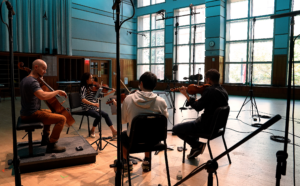
In 1946, following his graduation from Curtis and piano soloist debut with Eugene Ormandy and the Philadelphia Orchestra, legendary, trailblazing composer George Walker (Piano and Composition ’45)—the first African American composer to win the Pulitzer Prize for Music—wrote his astounding String Quartet No. 1, “Lyric.” Dedicated to the memory of Mr. Walker’s late grandmother, Melvina King, who passed away while he was composing the second movement (Molto adagio), this profoundly moving piece stands as a testament to the young, 24-year-old composer’s remarkable maturity, his technical prowess, heartfelt expression, and distinctive compositional voice. Praised for their “expert musicianship, razor-sharp ensemble, and deep musical feeling” (Chicago Tribune), the two-time GRAMMY-nominated Dover Quartet, Curtis’ Penelope P. Watkins Ensemble in Residence—featuring violinists Joel Link (String Quartet ’14, Violin ’11) and Bryan Lee (String Quartet ’14, Violin ’11), violist Julianne Lee (Violin ’05), and cellist Camden Shaw (String Quartet ’14, Cello ’11, ’10)—deliver a peerless interpretation of Mr. Walker’s devastatingly beautiful work, capturing its emotional depth and complexity with remarkable clarity and precision.
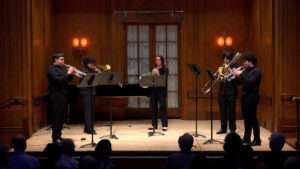 Award-winning composer, inspiring educator, community leader, and Curtis alumnus and faculty member Jonathan Bailey Holland’s (’96) Introit for Brass Quintet is, in the words of its creator, “a jaunty, short celebratory invocation in triple meter,” noting that “an introit, like a fanfare, is music that is meant to mark the beginning of a special occasion or event.” This lively work, featuring Curtis students and alumni—trumpeters Dasara Beta and Justin Bernardi (’22, ’24), horn player Kristin Andlauer, trombonist Diogo Fernandes (’24), and bass trombonist Noah Urquidi—was written while Mr. Holland was studying at the school in the mid-nineties and composed for friends and classmate at the time. It is a fitting tribute to his time at Curtis and evolution as one of the most in-demand composers of his generation.
Award-winning composer, inspiring educator, community leader, and Curtis alumnus and faculty member Jonathan Bailey Holland’s (’96) Introit for Brass Quintet is, in the words of its creator, “a jaunty, short celebratory invocation in triple meter,” noting that “an introit, like a fanfare, is music that is meant to mark the beginning of a special occasion or event.” This lively work, featuring Curtis students and alumni—trumpeters Dasara Beta and Justin Bernardi (’22, ’24), horn player Kristin Andlauer, trombonist Diogo Fernandes (’24), and bass trombonist Noah Urquidi—was written while Mr. Holland was studying at the school in the mid-nineties and composed for friends and classmate at the time. It is a fitting tribute to his time at Curtis and evolution as one of the most in-demand composers of his generation.
The late pioneering composer, pianist, conductor, dancer, and GRAMMY-nominated vocalist Julius Eastman (’63), who once described himself as “Black to the fullest, a musician to the fullest, a homosexual to the fullest,” became an eminent force in the New York music scene in the years following his graduation from Curtis, but sadly died in 1990, falling into relative obscurity until the 21st century. One of the first composers to fuse elements of pop and minimalist music, Mr. Eastman’s challenging, irreverent works never shied away from tackling the topic of his identity as a Black, queer artist or provoking discussions about homophobia and racism, and since the release of the mesmerizing box set Unjust Malise in 2005, his reputation as a composer has undergone a notable revival.
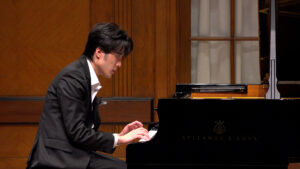 Eastman’s clever miniatures, Piano Pieces I-IV, transcribed by Elijah Daniel Smith, composition and New Music Ensemble associate at Curtis, and wonderfully interpreted by award-winning pianist and Curtis alumnus Jiacheng Xiong (’20), originated from a recorded performance Mr. Eastman gave at an “Evenings for New Music” event on December 15, 1968, at the Albright-Knox Art Gallery (now known as the Buffalo AKG Art Museum) in Buffalo, New York. Mr. Smith notes, “At first hearing, you may think this is just extraneous noise from things going on in the room—that is until you listen closely and realize that it is actually Eastman himself deliberately making bodily effects. It may sound crazy, but it is also something that only Eastman could present and brilliantly make work with his music.”
Eastman’s clever miniatures, Piano Pieces I-IV, transcribed by Elijah Daniel Smith, composition and New Music Ensemble associate at Curtis, and wonderfully interpreted by award-winning pianist and Curtis alumnus Jiacheng Xiong (’20), originated from a recorded performance Mr. Eastman gave at an “Evenings for New Music” event on December 15, 1968, at the Albright-Knox Art Gallery (now known as the Buffalo AKG Art Museum) in Buffalo, New York. Mr. Smith notes, “At first hearing, you may think this is just extraneous noise from things going on in the room—that is until you listen closely and realize that it is actually Eastman himself deliberately making bodily effects. It may sound crazy, but it is also something that only Eastman could present and brilliantly make work with his music.”
The recording closes with alumna Gabriella Smith’s (’13) Anthozoa, a hypnotic piece for prepared piano, sliding pizzicato cello, unpitched strikes on the violin, and a lively array of percussive found instruments. Praised by the L.A. Times as an “outright sensation” and deemed “the coolest, most exciting, most inventive new voice I’ve heard in ages” by Musical America, the prize-winning Curtis alumna and ecological activist’s imaginative compositions revel in the exploration of unexpected soundscapes, connecting audiences to nature and sparking joy and change through climate action.
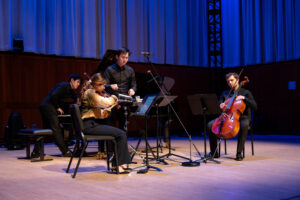 Inspired by recordings the composer made while taking a paddleboat out on the reefs of French Polynesia and named after a class of marine invertebrates that include sea anemones and coral, Anthozoa captures the aquatic sounds she found beneath the surface and along the seashell-scattered shoreline. The slinky, clinking, propulsive piece, featuring a delightful performance by Maya Anjali Buchanan (’24), cellist Matthew Christakos (’24), pianist Delvan Lin, and percussionist Tae McLoughlin (’24) concludes with an eerie passage that hints at the impending destruction of these fragile yet resilient undersea gardens, somehow thriving despite the continued threat of climate change, warming seas, bioerosion, overfishing, and pollution.
Inspired by recordings the composer made while taking a paddleboat out on the reefs of French Polynesia and named after a class of marine invertebrates that include sea anemones and coral, Anthozoa captures the aquatic sounds she found beneath the surface and along the seashell-scattered shoreline. The slinky, clinking, propulsive piece, featuring a delightful performance by Maya Anjali Buchanan (’24), cellist Matthew Christakos (’24), pianist Delvan Lin, and percussionist Tae McLoughlin (’24) concludes with an eerie passage that hints at the impending destruction of these fragile yet resilient undersea gardens, somehow thriving despite the continued threat of climate change, warming seas, bioerosion, overfishing, and pollution.
Curtis Studio – launched in 2022, is the in-house recording label of Curtis Institute of Music. Curtis Studio is dedicated to the discovery of new and traditional works performed by some of the most inspiring artists of our time and celebrates the groundbreaking artistry of Curtis students, faculty, and alumni. A Century of Sounds follows Curtis Studio’s acclaimed recordings Piano Trios of Weinberg, Auerbach, & Dvořák (Trio Zimbalist, 2024), Portraits (Viano Quartet, 2023), Revival (pianist Michelle Cann, 2023), and Scheherazade (Curtis Symphony Orchestra and Osmo Vänskä, 2022).
About the Curtis Institute of Music
At Curtis, the world’s great young musicians develop into exceptional artists, creators, and innovators. With a tuition-free foundation, Curtis is a unique environment for teaching and learning. A small school by design, students realize their artistic potential through intensive, individualized study with the most renowned, sought-after faculty. Animated by a learn-by-doing philosophy, Curtis students share their music with audiences through more than 100 performances each year, including solo and chamber recitals, orchestral concerts, and opera—all free or at an affordable cost—offering audiences unique opportunities to participate in pivotal moments in these young musicians’ careers. Curtis students experience a close connection to the most renowned artists and organizations in classical music, as well as innovative initiatives that integrate new technologies and encourage entrepreneurship—all within a historic campus in the heart of culturally rich Philadelphia. In this diverse, collaborative community, Curtis’s extraordinary artists challenge, support, and inspire one another—continuing an unparalleled 100-year legacy of musicians who have led, and will lead, classical music into a thriving, equitable, and multidimensional future. Learn more at Curtis.edu.
Photo Credits: 1.) David Shifrin; Matthew Hagestuen. 2.) Amy Yang and Patrick Williams; Matthew Hagestuen. 3.) Imani Winds (left to right): Brandon Patrick George, Toyin Spellman-Diaz, Monica Ellis, Drew Schlegel (Recording Engineer), Kevin Newton, and Mark Dover; Daniel J. Armistead. 4.) Daniel Matsukawa; Matthew Hagestuen. 5.) Katherine Needleman; Matthew Hagestuen. 6.) Dover Quartet (left to right): Joel Link, Bryan Lee, Camden Shaw, and Julianne Lee; Matthew Hagestuen. 7.) (Left to right): Justin Bernardi, Diogo Fernandes, Kristin Andlauer, Noah Urquidi, & Dasara Beta; Matthew Hagestuen. 8.) Jiacheng Xiong; Matthew Hagestuen. 9.) Delvan Lin, Maya Anjali Buchanan, Tae McLoughlin, & Matthew Christakos; Matt Genders.
***

